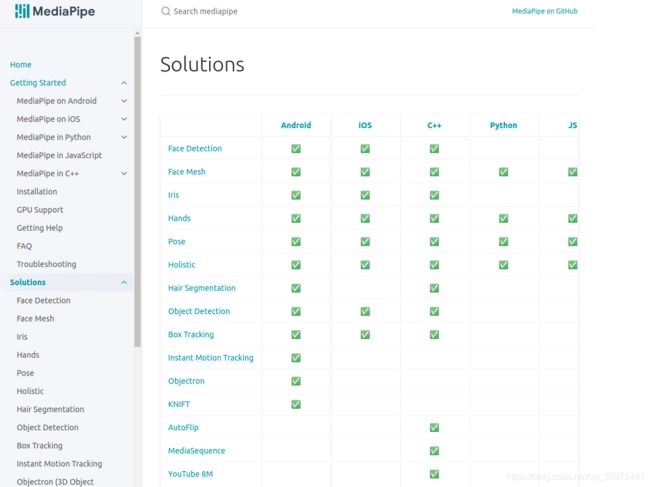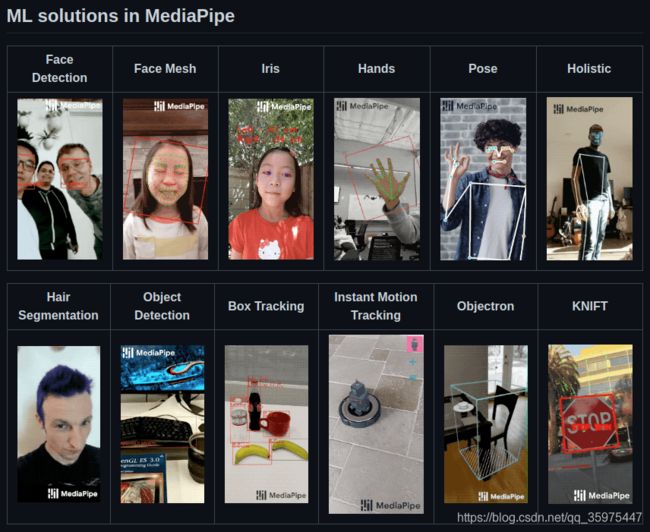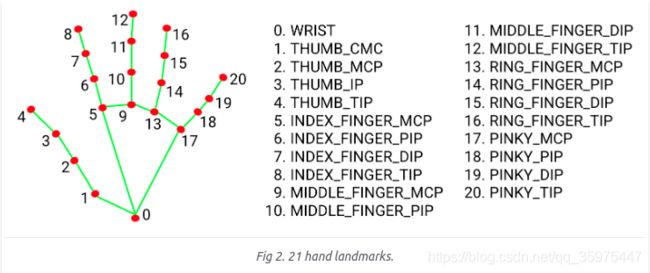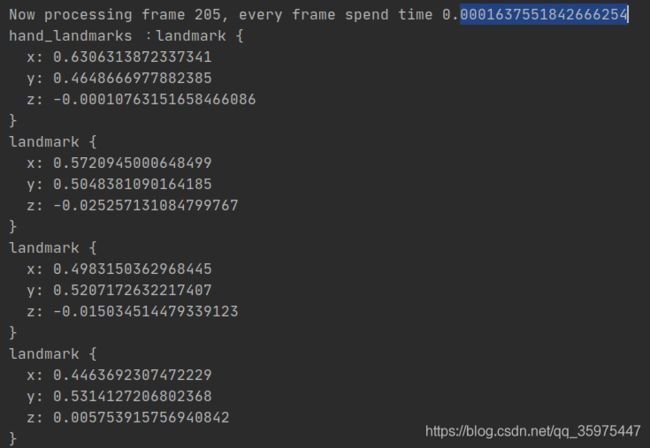【手部跟踪】google/mediapipe中的hand部分复现
参考链接:
1)github代码链接:https://github.com/google/mediapipe
2)说明文档:https://google.github.io/mediapipe
3)python环境配置文档:https://google.github.io/mediapipe/getting_started/python
4)API简单调用的使用文档:https://google.github.io/mediapipe/solutions/hands#python-solution-api
0.环境准备
python环境配置文档:https://google.github.io/mediapipe/getting_started/python
ubuntu20.04
cuda11.2
python3.8
opencv-python==4.1.2.30
mediapipe==0.8.2
sudo apt install -y protobuf-compiler
sudo apt install -y cmake
1.简介
稍微说明下,文档基本在第一个链接中,python中是通过安装mediapipe的pypi库,调用API来用的。
说明文档:https://google.github.io/mediapipe
github代码链接:https://github.com/google/mediapipe
2.实验
此处代码参考:API简单调用的使用文档:https://google.github.io/mediapipe/solutions/hands#python-solution-api
下面代码直接拷贝的官方文档,便于大家自己修改。有两种读图方式,第一种是文件名都读到一个列表里,其实可以改写成直接读目录下文件,然后存进一个列表里;第二种是通过读摄像头,这里也可以改写为直接读视频(对于台式机,可能不能使用摄像头的,直接就该这里吧)。
import cv2
import mediapipe as mp
mp_drawing = mp.solutions.drawing_utils
mp_hands = mp.solutions.hands
# For static images:
hands = mp_hands.Hands(
static_image_mode=True,
max_num_hands=2,
min_detection_confidence=0.5)
for idx, file in enumerate(file_list):
# Read an image, flip it around y-axis for correct handedness output (see
# above).
image = cv2.flip(cv2.imread(file), 1)
# Convert the BGR image to RGB before processing.
results = hands.process(cv2.cvtColor(image, cv2.COLOR_BGR2RGB))
# Print handedness and draw hand landmarks on the image.
print('Handedness:', results.multi_handedness)
if not results.multi_hand_landmarks:
continue
image_hight, image_width, _ = image.shape
annotated_image = image.copy()
for hand_landmarks in results.multi_hand_landmarks:
print('hand_landmarks:', hand_landmarks)
print(
f'Index finger tip coordinates: (',
f'{hand_landmarks.landmark[mp_hands.HandLandmark.INDEX_FINGER_TIP].x * image_width}, '
f'{hand_landmarks.landmark[mp_hands.HandLandmark.INDEX_FINGER_TIP].y * image_hight})'
)
mp_drawing.draw_landmarks(
annotated_image, hand_landmarks, mp_hands.HAND_CONNECTIONS)
cv2.imwrite(
'/tmp/annotated_image' + str(idx) + '.png', cv2.flip(annotated_image, 1))
hands.close()
# For webcam input:
hands = mp_hands.Hands(
min_detection_confidence=0.5, min_tracking_confidence=0.5)
cap = cv2.VideoCapture(0)
while cap.isOpened():
success, image = cap.read()
if not success:
print("Ignoring empty camera frame.")
# If loading a video, use 'break' instead of 'continue'.
continue
# Flip the image horizontally for a later selfie-view display, and convert
# the BGR image to RGB.
image = cv2.cvtColor(cv2.flip(image, 1), cv2.COLOR_BGR2RGB)
# To improve performance, optionally mark the image as not writeable to
# pass by reference.
image.flags.writeable = False
results = hands.process(image)
# Draw the hand annotations on the image.
image.flags.writeable = True
image = cv2.cvtColor(image, cv2.COLOR_RGB2BGR)
if results.multi_hand_landmarks:
for hand_landmarks in results.multi_hand_landmarks:
mp_drawing.draw_landmarks(
image, hand_landmarks, mp_hands.HAND_CONNECTIONS)
cv2.imshow('MediaPipe Hands', image)
if cv2.waitKey(5) & 0xFF == 27:
break
hands.close()
cap.release()运行测试的结果:
3.输出中hand_landmarks的解释
以这里的landmark为例,一个手部有21个关键点,x,y分别是宽、高归一化的结果,z是深度。
hand_landmarks.landmark[mp_hands.HandLandmark.INDEX_FINGER_TIP].x根据以上来与关键点命名来读取,对应的点坐标。




